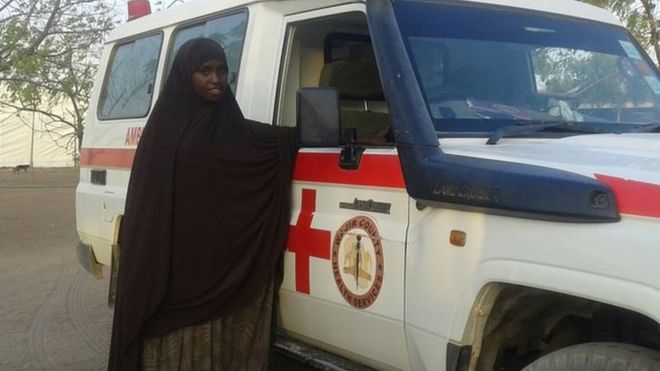Kenya’s pioneering ambulance driver

At 23 years old, she is also the youngest member of the team working for Wajir’s emergency department.
It is a tough, high-pressure job under normal circumstances – and she often travels vast distances on difficult dirt roads to collect patients.
“My job involves saving lives and this requires me to be alert the whole day,” she says.
“Sometimes I have to speed to ensure I get to people in need of help.”
What she does not mention is the dangerous security situation in this arid area of Kenya.
It has frequently been the target of attacks by al-Shabab, the al-Qaeda linked Islamist group that is based across the border in Somalia.
On several occasions, Ms Farah has put her life in danger to rescue the victims of gun attacks, which the Kenyan government has blamed on the insurgents.
Somalia is just 100km (60 miles) east of Wajir, making it possible for militants to cross the border and carry out attacks in Kenyan territory.
Last year, a UN report said that Wajir county had the second highest maternal death rate in Kenya, with 581 deaths registered.
Ms Farah is well known in Wajir town, where she is on call to help victims of road accidents, pregnant mothers and victims of animal attacks, as well as those caught up in attacks by militants.
And there are other challenges she faces which are not linked to security or the dangers of driving long distances.
In this conservative part of Kenya, it is very unusual for women to drive cars, let alone ambulances.
But it is not women who disapprove of her, she says.
They appreciate her work, often coming to chat to her in the ambulance.
However, as a role model, she does not want to discourage other women by telling them how hard the job is.
”They would be surprised if they knew what being the driver of an emergency vehicle meant,” she says.
“I am sure they would be filled with empathy if they knew that I wake up late in the night and get into risky situations.”
Her family are not too happy about her choice of career.
In particular, they worry about the unusual hours that being an ambulance driver entails.
“They are concerned because of the times I am woken up in the middle of the night,” Ms Farah says.
“My brothers are forced to take me to the vehicle so that I can drive to the emergency scene.”
But Ms Farah would not have it any other way – saying her motivation is to save lives.
BBC